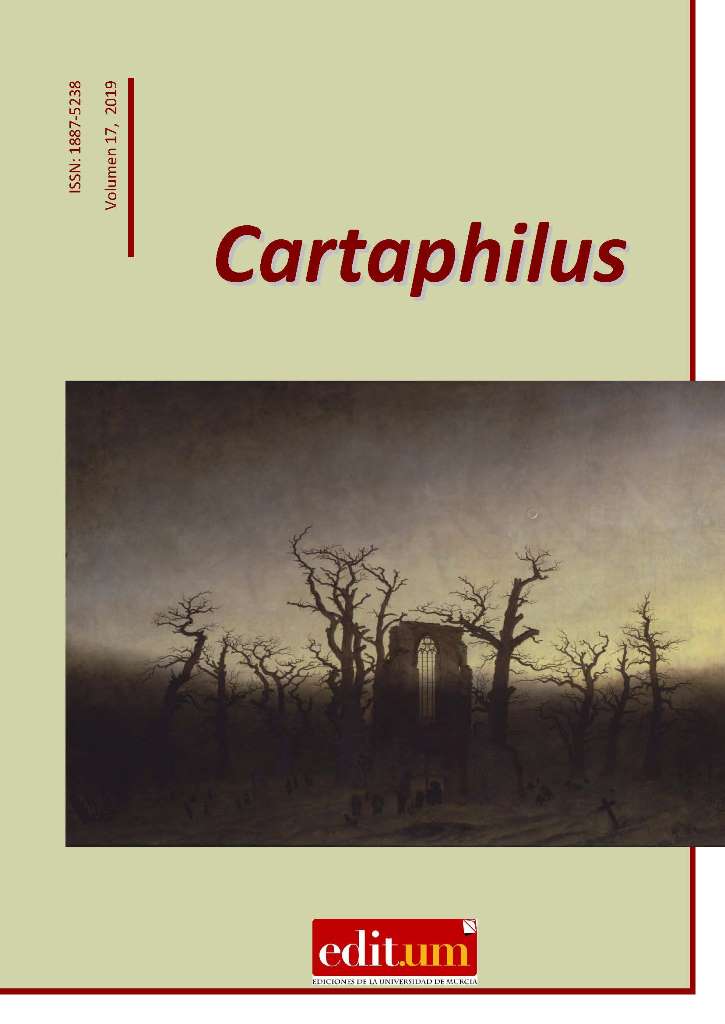Electra’s Door and Lavinia’s Door. A comparative analysis of Virgilio Piñera and Eugene O’Neill’s Electras
Abstract
Both Eugene O’Neill and Virgilio Piñera wrote their own versions of the classical myth of Electra as a critique of the distinct societal structures they perceived in the United States and Cuba respectively. Only a decade apart, these reinterpretations focus on the nature of the relationships between parents and children and on the urge to emancipate from inherited traditions and parental constraints. This comparative essay thus highlights the similarities and differences in the plays Mourning Becomes Electra by O’Neill and Electra Garrigó by regarding the ways both authors reimagined the Greek myth, using different critical approaches: while O’Neill relies on Freudian psychoanalysis to delve into family dynamics, Piñera has a tendency towards existentialism and Cuban choteo. Their works are an appeal to a rebellion against cultural structures based on tradition in order liberate oneself from their crippling nature. While the American author condemns his Electra character (named Lavinia Mannon) to a life determined by psychological constraints resulting from her parent’s behavior, Piñera makes his Electra (whose surname is Garrigó) emancipated and in the position to break with tradition in order to pursue her own fate. Despite both characters remaining locked in their own mansions, Lavinia Mannon is trapped due to her psychological inability to escape her own destiny, whereas Electra Garrigó does it because it is her own free choice to do so. Ultimately, this essay shows how these authors share a common message that they carry out in completely distinct ways.
Downloads
-
Abstract607
-
pdf (Español (España))404
References
BIBLIOGRAFÍA
ADSUAR FERNÁNDEZ, M. D., & CERVERA SALINAS, V. (2015). Virgilio Piñera o las máscaras del teatro cubano. En PIÑERA, V. Teatro Selecto. Madrid: Verbum, pp. 11-68.
ALEXANDER, D. M. (1953). Psychological Fate in Mourning Becomes Electra. PMLA, 68(5), 923-934.
BERNAL CASTELLANO, A. (2013). El no de las niñas: Electra Garrigó y Antígona. Cartaphilus: Revista de investigación y crítica estética, 11, 35-53.
BOYER, P. S., CLARK, C. E., HAWLEY, S. M., KETT, J. F., RIESER, A., SALISBURY, N., Sitkoff, H., & Woloch, N. (2010). The Enduring Vision: A History of the American People. Volume One: to 1877. Boston, MA: Cengage Learning.
CABRERA, Y. (2011). La puerta Electra: tradición clásica y ruptura en el teatro cubano contemporáneo. Caribe: revista de literatura y cultura, 14(2), 55-76.
CERVERA SALINAS, V. (1995). Electra Garrigó de Virgilio Piñera: años y leguas de un mito teatral. Cuadernos hispanoamericanos, 545, 149-156.
CIPOLLONI, M. (2002). Electra por dentro y por fuera: las orestíadas americanas de O’Neill y Piñera. Theatralia: revista de teoría del teatro, 4, 293-310.
CLARK, B. H. (1932). Aeschylus and O’Neill. The English Journal, 21(9), 699-710.
DE MURPHY, R. A. (2001). Representación absurdista del mito clásico de Electra Garrigó: desmitificación, humor e incomunicabilidad lingüística. Caribe: revista de literatura y cultura, 4-5(1), 80-92.
FRENZ, H., & MUELLER, M. (1966). More Shakespeare and Less Aeschylus in Eugene O’Neill’s Mourning Becomes Electra. American Literature, 38(1), 85-100.
GUERRERO ALMAGRO, B. (2014). La obra teatral de Piñera desde la óptica de Pirandello: procedimientos metadramáticos y personajes autoconscientes. Cartaphilus: Revista de investigación y crítica estética, 13, 187-214.
GUTIÉRREZ GROVA, A. (2014). Electra Garrigó: El estéril (y ridículo) decoro de los Atridas. Aletria: Revista de estudios de literatura, 24(1), 55-65.
MURPHY, B. (1998). O’Neill’s America: the strange interlude between the wars. En Michael Manheim (Ed.), The Cambridge Companion to Eugene O’Neill (pp. 135-147). Cambridge: Cambridge University Press.
O’NEILL, E. (1966). Mourning Becomes Electra. Londres: Jonathan Cape.
PIÑERA, V. (2015). Electra Garrigó. En V. Piñera, Teatro Selecto (pp. 69-106). Madrid: Verbum.
RANALD, M. L. (1998). From trial to triumph: the early plays. En Michael Manheim (Ed.), The Cambridge Companion to Eugene O’Neill (pp. 51-68). Cambridge: Cambridge University Press.
ROBINSON, J. A. (1998). The middle plays. En Michael Manheim (Ed.), The Cambridge Companion to Eugene O’Neill (pp. 69-81). Cambridge: Cambridge University Press.
TÖRNQVIST, E. (1998). O’Neill’s philosophical and literary paragons. En Michael Manheim (Ed.), The Cambridge Companion to Eugene O’Neill (pp. 18-32). Cambridge: Cambridge University Press.
Works published in this journal are subject to the following terms:
1. The Servicio de Publicaciones of the University of Murcia (the publisher) reserves the copyright of the published works and encourages and allows their reuse under the usage licence indicated in point
© Servicio de Publicaciones, Universidad de Murcia, 2015
2. Works are published in the electronic edition of the journal under a Creative Commons Reconocimiento-NoComercial-SinObraDerivada 4.0 International licence (legal text). They may be copied, used, disseminated, transmitted and publicly displayed, on condition that: i) the author and original source of the publication are cited (journal, publisher and URL of the work); ii) the material is not used for commercial purposes; iii) the existence and specifications of this licence for use are mentioned.

3. Self-archiving conditions We allow and encourage authors to electronically disseminate the preprint versions (the pre-review version) and/or post print (the version that has been reviewed and accepted for publication) of their works before they are published as this encourages earlier circulation and dissemination and so a potential increase in their citation and impact in the academic community.




